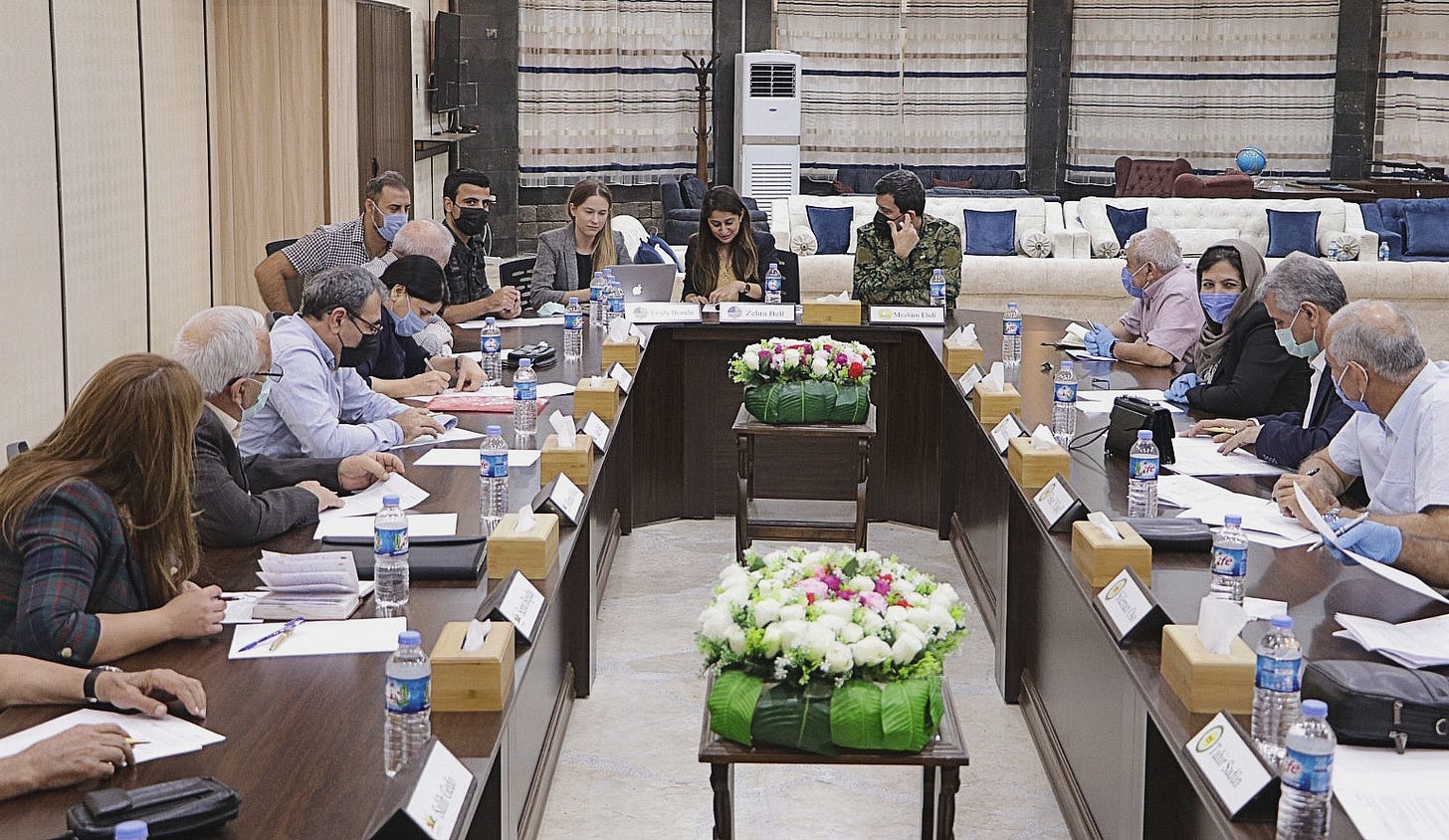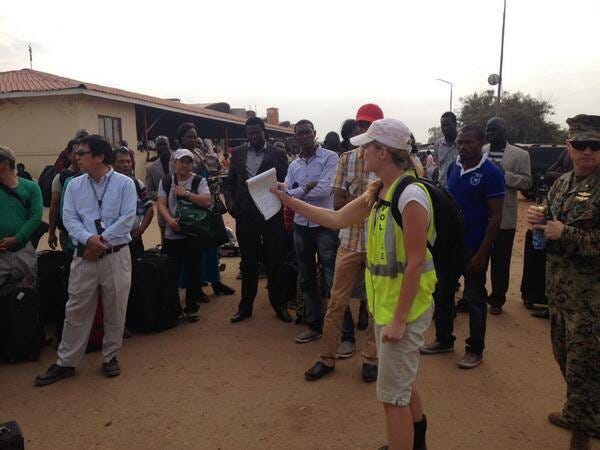Preview: Q&As with Zehra Bell & Elizabeth Shackelford
Plus: Share your stories about working with Linda Thomas-Greenfield
A career Foreign Service Officer, Zehra Bell most recently served as the Political Chief for the Syria Transition Assistance Response Team. On the phone from Istanbul, Zehra reflected on the worst moment of her life (and the flip side), what so many get wrong about the duties of a diplomat, and even how the “Gilmore Girls” impacted her dreams and ambitions as a teenage girl writing her own ticket to see the world.
Below is a free preview. My full conversation with Zehra will be published for paid subscribers later this afternoon.
Do you remember when and how you knew you would be at home in the world?
I felt at home in the world from the very beginning. My mother is from Mombasa, Kenya and my father from Zanzibar, Tanzania. I distinctly remember being weird, being an outsider in my elementary school. My food smelled funny and my culture (as the only Muslim kid) made me feel at times so alone.
I became convinced early that I would belong more in the world and I feel like I was proved right!
What do people get wrong about the life of a Foreign Service Officer? Are there stereotypes that you've found to be true?
What do people get wrong? That it’s all cocktail parties in Paris [laughs]. I started in Kuwait and then went to Iraq. After that, it’s been mostly back-and-forth between Iraq and Syria where I’ve been mostly living out of shipping containers. I live in Istanbul at the moment, which is a very glamorous city, but I’m not doing glamorous work. I obviously work very closely with the military, I sleep and eat in the same places. I don’t think that’s widely understood.
So many people imagine diplomats toasting with foreign dignitaries even when we’re serving in places like Syria where, in reality, we’re drinking moonshine in a hooch [laughs].
Having said that, I love these assignments. I’ve spent most of the last two years working in Northeast Syria doing what I live for, which is the cutting edge of diplomacy where your relationships directly impact our mission. I have learned the art of persuasion in a way that’s different from what you’re asked to do when you’re working in London, Brussels, or Paris. And it’s good that our job has room for different types of diplomacy. Both are very important. But I feel lucky for what I’ve gotten to do.
Getting Syrian Kurdish rivals in a room negotiating over a draft text? That to me is why I joined the Foreign Service.
Check out my full conversation with Zehra at noon.
Then-Foreign Service Officer Elizabeth Shackelford’s 2017 resignation letter brought to the forefront much of the professional turmoil roiling the ranks of career diplomats during the first year of the Trump presidency. Since then Lizzy has written a book about the ups and downs of her time with the department. In our conversation, she shares her advice on best practices for the Biden foreign policy team, as well as personal lessons she’d impart on those just beginning their careers at the State Department.
Below is a free preview of my conversation with Elizabeth, which will run in full for paid subscribers tomorrow morning.
Was there a private struggle that you think, reflecting back upon now, might be a comfort or prove instructive for those just beginning their careers?
I considered joining the Foreign Service for several years before I actually applied. I was deterred by the one-to-two years of mandatory consular work that every junior officer is required to do.
My advice to others with those same reservations is not to worry about it — a year or two sounds very long early in your career, but it goes by in a flash. It’s also valuable time learning and using new languages and skills, getting to know different aspects of the population where you’re living, and helping Americans in need.
I’d offer similar advice to other people early in their careers fretting over which path to take. A year or two goes by quickly, so don’t be afraid to try something you’re interested in but not certain about. Early career choices don’t lock you in for a lifetime. You can explore new paths along the way. I’ve explored several.
And now I'd love to take the work you've done both outside and inside State and consider the ways in which you think the department can address persistent and pervasive gaps in hiring and promoting non-white employees, particular women. It's a problem that did not originate during the Trump administration though it was certainly exacerbated. What are tangible and out-side-the-box ways to make significant and sustained changes?
It isn’t hard to change hiring practices, and we’ve done that in the past, but it isn’t sufficient. When I entered the Foreign Service in 2010, it was with a diverse group of entry-level officers, but most who have left by now were women and people of color. It is also important but not sufficient to appoint diverse leaders. Where the government and State in particular routinely fall short is the mid-career follow through.
Changing practices throughout the middle ranks is essential to change the culture, and State still has a very non-diverse culture. This actually isn’t outside-the-box thinking. Many reports have made clear how we can start to address these issues. It’s a failure to implement them so far.
Doing so will come down to deliberate human resources practices to counter the unconscious bias in promotions, performance reviews, and assignments. We need to routinely collect and analyze disaggregated data in all of these areas to get a full picture of our diversity problem, where it comes into play, and how we can address it effectively.
The full conversation with Elizabeth will be published for paid subscribers on Wednesday morning.
FYI: Senate Expected to Confirm Blinken Today
Later today, the Senate is expected to confirm Antony Blinken’s nomination to become the nation’s top diplomat. The Senate Foreign Relations Committee approved his nomination on Monday in a 15-3 vote with Sens. John Barrasso, Rand Paul and Ted Cruz voting against.
On Wednesday at 10 a.m., the Senate Foreign Relations Committee will hold a hearing on the nomination of Linda Thomas-Greenfield to be the next U.N. ambassador.
And speaking of LTG…
Have you worked with Linda Thomas-Greenfield?
I would love to hear from you if you have worked alongside Ambassador Linda Thomas-Greenhouse, Joe Biden’s choice to become U.S. Ambassador to the United Nations.
If you know LTG, would you like to share a story? If your paths have not crossed but you have advice and/or hopes for her tenure, please also shoot me an email at jennifer.koons@protonmail.ocm or share in the comments below. A separate post will feature all of the stories in one place.







